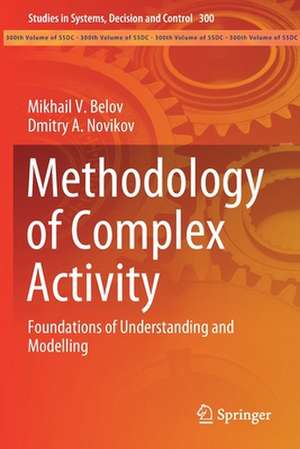Methodology of Complex Activity: Foundations of Understanding and Modelling: Studies in Systems, Decision and Control, cartea 300
Autor Mikhail V. Belov, Dmitry A. Novikoven Limba Engleză Paperback – iul 2021
The structural components of complex activities are considered, and their logical, cause-and-effect, and process structures are functionally described. Considerable attention is paid to organization and management, uncertainties, and the lifecycles of activities, as well as the actors, subject matter, resources, knowledge, and methods involved.
Several typical examples are used throughout the text to illustrate the implementation of common approaches involving the functioning of work groups, organizational units, projects, and organizations in general: a retail bank, an aircraft manufacturer, a fire department, and a nuclear power plant. In addition, the book employs a system of connected technical models, in order to ensure that the results are of practical applicability for both experts on the ground and scholars engaged in research on the general principles of how activities (practical, scientific, etc.) are organized or on the management of socio-technical systems.
| Toate formatele și edițiile | Preț | Express |
|---|---|---|
| Paperback (1) | 637.59 lei 6-8 săpt. | |
| Springer International Publishing – iul 2021 | 637.59 lei 6-8 săpt. | |
| Hardback (1) | 643.84 lei 6-8 săpt. | |
| Springer International Publishing – iul 2020 | 643.84 lei 6-8 săpt. |
Din seria Studies in Systems, Decision and Control
- 18%
 Preț: 937.89 lei
Preț: 937.89 lei - 18%
 Preț: 729.53 lei
Preț: 729.53 lei - 20%
 Preț: 627.42 lei
Preț: 627.42 lei - 15%
 Preț: 644.18 lei
Preț: 644.18 lei - 18%
 Preț: 900.80 lei
Preț: 900.80 lei - 18%
 Preț: 947.35 lei
Preț: 947.35 lei - 20%
 Preț: 1467.93 lei
Preț: 1467.93 lei - 15%
 Preț: 646.30 lei
Preț: 646.30 lei - 18%
 Preț: 1012.84 lei
Preț: 1012.84 lei - 15%
 Preț: 653.33 lei
Preț: 653.33 lei - 9%
 Preț: 655.02 lei
Preț: 655.02 lei - 20%
 Preț: 835.24 lei
Preț: 835.24 lei - 18%
 Preț: 1112.30 lei
Preț: 1112.30 lei - 20%
 Preț: 934.27 lei
Preț: 934.27 lei - 24%
 Preț: 726.60 lei
Preț: 726.60 lei - 18%
 Preț: 1004.81 lei
Preț: 1004.81 lei - 20%
 Preț: 924.74 lei
Preț: 924.74 lei - 18%
 Preț: 1010.48 lei
Preț: 1010.48 lei - 20%
 Preț: 932.21 lei
Preț: 932.21 lei - 18%
 Preț: 1007.35 lei
Preț: 1007.35 lei - 18%
 Preț: 752.43 lei
Preț: 752.43 lei - 18%
 Preț: 1000.24 lei
Preț: 1000.24 lei - 18%
 Preț: 999.45 lei
Preț: 999.45 lei - 18%
 Preț: 1016.81 lei
Preț: 1016.81 lei - 18%
 Preț: 949.73 lei
Preț: 949.73 lei - 18%
 Preț: 1119.38 lei
Preț: 1119.38 lei - 18%
 Preț: 1412.20 lei
Preț: 1412.20 lei - 20%
 Preț: 1163.21 lei
Preț: 1163.21 lei - 18%
 Preț: 1116.26 lei
Preț: 1116.26 lei - 18%
 Preț: 783.20 lei
Preț: 783.20 lei - 18%
 Preț: 952.09 lei
Preț: 952.09 lei - 20%
 Preț: 1472.54 lei
Preț: 1472.54 lei - 18%
 Preț: 1392.46 lei
Preț: 1392.46 lei - 20%
 Preț: 1180.52 lei
Preț: 1180.52 lei - 18%
 Preț: 1567.67 lei
Preț: 1567.67 lei - 20%
 Preț: 984.18 lei
Preț: 984.18 lei - 20%
 Preț: 369.86 lei
Preț: 369.86 lei - 20%
 Preț: 1281.17 lei
Preț: 1281.17 lei - 18%
 Preț: 1582.67 lei
Preț: 1582.67 lei - 18%
 Preț: 1112.30 lei
Preț: 1112.30 lei - 20%
 Preț: 1055.94 lei
Preț: 1055.94 lei - 18%
 Preț: 1405.90 lei
Preț: 1405.90 lei - 18%
 Preț: 961.55 lei
Preț: 961.55 lei - 20%
 Preț: 1053.48 lei
Preț: 1053.48 lei - 20%
 Preț: 1049.37 lei
Preț: 1049.37 lei - 18%
 Preț: 1005.74 lei
Preț: 1005.74 lei - 18%
 Preț: 1225.94 lei
Preț: 1225.94 lei - 18%
 Preț: 1232.26 lei
Preț: 1232.26 lei
Preț: 637.59 lei
Preț vechi: 750.11 lei
-15% Nou
Puncte Express: 956
Preț estimativ în valută:
122.01€ • 128.29$ • 100.81£
122.01€ • 128.29$ • 100.81£
Carte tipărită la comandă
Livrare economică 16-30 aprilie
Preluare comenzi: 021 569.72.76
Specificații
ISBN-13: 9783030486129
ISBN-10: 3030486125
Ilustrații: XIV, 223 p. 70 illus., 9 illus. in color.
Dimensiuni: 155 x 235 mm
Greutate: 0.34 kg
Ediția:1st ed. 2020
Editura: Springer International Publishing
Colecția Springer
Seria Studies in Systems, Decision and Control
Locul publicării:Cham, Switzerland
ISBN-10: 3030486125
Ilustrații: XIV, 223 p. 70 illus., 9 illus. in color.
Dimensiuni: 155 x 235 mm
Greutate: 0.34 kg
Ediția:1st ed. 2020
Editura: Springer International Publishing
Colecția Springer
Seria Studies in Systems, Decision and Control
Locul publicării:Cham, Switzerland
Cuprins
Formulation of Problems and General Approaches.- Complex Activity and its System-Wide Character.- Structural Models of Complex Activity.- Uncertainty and Creation of Complex Activity Components.- Process Models of Complex Activity.- Effectiveness and Efficiency of Complex Activity.- Organization and Management of Complex Activity.
Textul de pe ultima copertă
This book develops and describes a general methodology that can be applied to any complex human activity (activity with a non-trivial, multi-level internal structure).
The structural components of complex activities are considered, and their logical, cause-and-effect, and process structures are functionally described. Considerable attention is paid to organization and management, uncertainties, and the lifecycles of activities, as well as the actors, subject matter, resources, knowledge, and methods involved.
Several typical examples are used throughout the text to illustrate the implementation of common approaches involving the functioning of work groups, organizational units, projects, and organizations in general: a retail bank, an aircraft manufacturer, a fire department, and a nuclear power plant. In addition, the book employs a system of connected technical models, in order to ensure that the results are of practical applicability for both expertson the ground and scholars engaged in research on the general principles of how activities (practical, scientific, etc.) are organized or on the management of socio-technical systems.
The structural components of complex activities are considered, and their logical, cause-and-effect, and process structures are functionally described. Considerable attention is paid to organization and management, uncertainties, and the lifecycles of activities, as well as the actors, subject matter, resources, knowledge, and methods involved.
Several typical examples are used throughout the text to illustrate the implementation of common approaches involving the functioning of work groups, organizational units, projects, and organizations in general: a retail bank, an aircraft manufacturer, a fire department, and a nuclear power plant. In addition, the book employs a system of connected technical models, in order to ensure that the results are of practical applicability for both expertson the ground and scholars engaged in research on the general principles of how activities (practical, scientific, etc.) are organized or on the management of socio-technical systems.
Caracteristici
Develops and describes a general methodology that can be applied to any complex human activity Presents several typical examples throughout the text to illustrate the implementation of common approaches Reveals the structural components of complex activities, and functionally describes their logical, cause-and-effect, and process structures Illustrates that considerable scrutiny is given to organization and management, uncertainties, and the life cycles of activity, as well as the actors, subject matter, resources, knowledge, and methods involved in this activity























